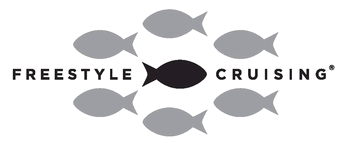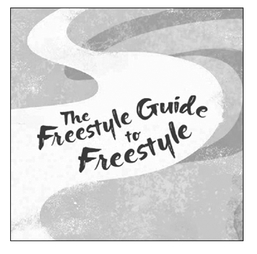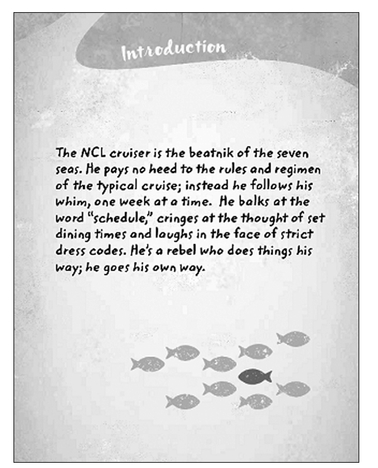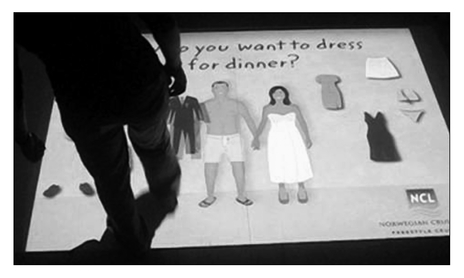13
HOW PURPOSE
CAN SET YOU FREE
FROM THE SEA OF SAMENESS
Defying cruise convention to deliver a liberating experience for all.
If you are part of an organization that has never formally articulated a set of core values driving your culture or a core purpose explaining your reason for being, the prospect of doing so may seem overwhelming. Norwegian Cruise Line (NCL) is a great example to show that sometimes the key to unlocking your values and purpose is right under your nose. Sometimes an innovative product or service you’ve developed may be indicative of underlying institutional values and a purpose that have never been explicitly expressed. When you explore the underlying beliefs behind the innovation, you may soon discover a rich set of values and a clear pathway to your purpose.
Norwegian Cruise Line came to us in 2005 with a request to help build awareness for a little something that they had developed called Freestyle Cruising. Freestyle Cruising was developed in response to customer complaints about the regimented approach to dining that’s standard in the cruise industry. This means having to sit next to the Plotnicks from Long Island or the Winkles from Cleveland every night at 5:00 p.M. every day of your vacation. Freestyle Cruising obliterates scheduled dining times and preassigned seating and offers over half a dozen restaurant options that guests are free to frequent whenever and with whomever they please.
Freestyle Cruising also does away with strict dress codes that most cruise lines have for different events—the logic being, maybe people would like to wear whatever they want when they’re on vacation.
Before we produced any work to build the brand, we wanted to get inside the company and identify the values and purpose behind the creation of Freestyle Cruising. In doing so, we could not only create better advertising and marketing materials down the road, we could also help to focus the organization on creating more innovative products and services that would support and enhance the brand in truly meaningful ways.
We asked all of NCL’s best employees (the star performers) across a wide variety of functions the following questions: What core values do you personally bring to work every day that are nonnegotiable for the work that you do? What core values are supported, rewarded, and critical to the success of NCL?
This is what we heard from those we asked:
Innovation rose to the surface very quickly. “NCL is the innovator. We created Freestyle, homeland cruising, NCL America. . . . We’re constantly looking for new and exciting ways to improve the industry.” Turns out that NCL has a history of firsts in the cruise industry—Freestyle Cruising just happened to be the latest manifestation of that.
Freedom and Flexibility were also values that went hand in hand with the innovation value. NCL employees felt that the NCL culture gave employees the freedom and flexibility they needed to do their jobs and, not surprisingly, they were creating products and services designed to give their customers more freedom and flexibility on their ships.
Teamwork is another value that emerged that’s indispensable when pulling off the gargantuan task of turning ships around as efficiently and flawlessly as NCL does every weekend in ports all over the world.
And finally, the value of fun. People at NCL don’t take themselves too seriously. They love their jobs and have a lot of fun exploring ways to delight their guests throughout the experience.
Resorts don’t tell people what to wear, when and with whom to eat, and where to go after dinner. . . . We have to match resorts in their ability to offer an unstructured, casual, attentive atmosphere in which to decompress from everyday life.
—Colin Veitch, NCL president and CEO, Chicago Tribune, January 21, 2001
We articulated NCL’s values in the following way:
Innovation: Constantly pushing for new and better ways to delight people at sea.
Freedom and Flexibility: Whatever it takes to get the job done.
Teamwork: We’re all in this together.
Fun: Let’s have some!
Core values don’t have to have any direct connection to the core purpose of the organization. But, in this case, they did. When we asked people what they were really passionate about, their answers would invariably come around to the idea of innovating in order to deliver a new and better guest experience than what conventional cruising could offer. When we asked what NCL could truly be the best in the world at, employees said things like giving people more freedom and flexibility than anyone else in the industry. In fact, when we looked at the history of innovations that had come out of NCL, many of the most notable ones were designed to give people more choices, flexibility, and freedom than had previously been available in the industry. When we asked what the world would lose if NCL ceased to exist, employees spoke passionately about the industry losing a pioneer: “It would be like a reverse back in time . . . the industry would lose the innovator, the cruise line that goes out on a limb to try new routes, new programs, new ports of call.”
And they also spoke passionately about the freedom, flexibility, and choice the customer would lose:
“Customers would be limited to more cookie-cutter cruises . . . it would put people back in the cattle herd experience most cruise ships offer.” All their answers pointed us in the clear direction of an overarching purpose for NCL, which had never been articulated but was nevertheless alive and well in the organization:
Defying cruise convention to deliver a liberating experience for all.
So much of NCL’s drive to innovate was directed at the conventions of the industry that actually inhibit the freedom, flexibility, and escape from the demands of daily life people are seeking when they go on vacation. By understanding the values and purpose of the organization, all of a sudden Freestyle Cruising became much more than a feature that we needed to increase awareness of—it became compelling proof of a larger purpose that could help us tell a more meaningful story about the brand.
POSITIONING BEYOND DEFEAT
The next step is to figure out how to best position the brand in the marketplace to bring the purpose to life in a way that resonates with customers and differentiates you from the competition. To that end, we have to answer the question:
What do we have that people want that the competition isn’t giving them?
Americans are some seriously overworked, overtired, overscheduled, and stressed-out people. They work 49.5 weeks a year, which translates to 499 more hours than Germans, 260 more hours than Brits, and 137 more hours than the Japanese! They feel burdened by their commitments to what can feel like everyone but themselves—their bosses, their children, their community endeavors. Now the good news is, all that stress means that people need vacations that liberate them from the tyranny of their frenetic lives. They need an opportunity to take care of themselves for a change. The word leisure, from the Latin word licere, actually means “to be permitted.” And that’s just what people want—to be permitted to do whatever they want, whenever they want, in pursuit of their own personal interests.
What surprised us was just how overlooked this fundamental driver of vacations is in the marketplace. It’s true that there is a broad range of things that people say they need out of their vacation—you should be able to relate to these if you’re a human being in need of a vacation:
• Need to escape > Freedom from pressure and responsibility
• Need to do nothing > Freedom from “shoulds”/space to do nothing
• Need to pursue personal interests > Freedom from serving everyone else’s needs
• Need to indulge > To be treated like royalty/to get pampered
• Need for novelty > Freedom to try something new
• Need for stimulation > Freedom to go on an adventure/explore /learn
Now think about which one of those is at the top of your priority list for your next vacation? If you’re like most Americans, far and away the most frequently mentioned need is the need to be free from the pressures and stresses of everyday life. While they may want sprinkles of indulgence, novelty, and stimulation, what they really want is freedom from the regimentation and demands of daily life and the freedom to do whatever they want for a change.
So far the fundamental purpose of NCL seemed to be right in the strike zone of what people want in a vacation. So we needed to understand what kind of competition NCL really faced in terms of satisfying this fundamental desire that people have.
Despite the fairly obvious fact that what most people want out of a vacation is the chance to unplug, unwind, and do their own thing, not one of NCL’s direct competitors was positioning their brand to fulfill that need. Carnival (the Fun Ship) and Royal Caribbean (the thrill-seeker /Adventure ship) position their brands to appeal to a desire for adventure and excitement—a far less frequently mentioned need and one that is frankly better fulfilled by land vacations.
Holland America and Celebrity position their brands around premium, luxury experiences in an attempt to overturn the stigma of mass-market mediocrity that often hinders companies in this category. But the fundamental motivation for taking a vacation wasn’t really being addressed by anyone in the category—certainly not in any overt or focused manner. So it seemed that we were sailing right into uncharted waters (pardon the pun).
The real threat to claiming this position emerged from exploring consumer attitudes toward cruising in general. Quick. When I ask, what do you think of when you think of taking a cruise? What pops into your mind? Do you immediately see it as a solution to your overstressed, overscheduled, overcommitted life? Probably not. If you’re like many people, you might just envision loads of people being herded around a ship from one meal to another, looking at their watch for when the next scheduled activity might begin. Many people who have experienced conventional ships complain about the loss of control over how they spend their day, when and with whom they’ll be able to eat, and what and where they can dress down. These are all factors that greatly undermine the sense of freedom, escape, and stress-free experiences they’re ultimately seeking.
This was a perceptual challenge that we could really sink our teeth into thanks to the work done by NCL to create Freestyle Cruising. Freestyle Cruising provided a unique opportunity to overturn negative perceptions of cruising and deliver the experience that people are ultimately seeking from a vacation experience.
With Freestyle Cruising, each individual is liberated from the oppression of the clock and is given the freedom to do exactly what he or she wants to do. It gives people a level of freedom that’s hard to find on land and unexpected at sea, and that’s a clear competitive advantage over the direct competition. At its best, Freestyle Cruising from NCL delivers ultimate freedom from the demanding and stressful lives that Americans lead and provides the freedom to create an experience on their own terms.
We expressed NCL’s positioning as:
“Go Your Own Way” Freestyle Cruising from NCL frees you from the demands of daily life and gives you the opportunity to go your own way.
FINDING FREESTYLERS
Part of positioning yourself to win includes finding the perfect audience that will be most receptive to your message. We start with the basic demographic profiling of individuals who take cruises—adults over age 45, household incomes of $50,000 plus, educated, family oriented . . . the very basic profiling of the type of people typically engaged in the category. But we try to find people who not only fit the category but also fit the brand. We wanted people who cared about personal freedom and choice, who valued flexibility, and who were comfortable with an “anything goes” environment. We found a psychographic segment that agreed with statements like I’m open to new experiences, I like to do things my way, I prefer vacations without organized activities or set schedules.
It turns out that there are forty-four million people in America who fit the cruising profile (whether they’ve cruised or not) and share these attitudes, and they happen to be highly concentrated in about eighteen key markets in America. This degree of customer concentration allowed us to be very efficient with our media spending. We called this group of people Freestylers, and they became the focus of our marketing efforts.
Launching Our Story with a Rebellious Little Fish

When it came time to build the brand around the purpose and positioning, a very young creative person developed a simple little icon that came to be known as the
rebellious fish, which probably tells the brand story as powerfully as anything can. We’ve used it to express the spirit of Freestyle to employees, to the travel agents who are critical influencers in telling the brand story, and to potential and current guests. And if it isn’t obvious by simply looking at it, we’ve told the story of the rebellious fish to our employees and to the trade this way:
We are the fish that swims in the opposite direction. This is our brand. It’s not our logo or a mascot, but it stands for our idea of what cruising should be. It stands for Freestyle Cruising. As you know, Freestyle Cruising means our guests are off the clock. They don’t have to plan their day around a set dinner time where you’re forced to make small talk with the Wurtzels from Baltimore. They can follow their fancy. Sleep in. Eat late. Linger on shore. Whatever they want. It’s their vacation, isn’t it?
It also provides a very quick read in environments where people are moving along rapidly and are highly unlikely to stop and read long copy in an advertisement.
Calling On All Employees to Become Rebellious Fish
Employee Guide to Freestyle Cruising distributed to all employees prior to launch of campaign.
As always, the first people you need to get on board with the purpose, values, and positioning are the employees. We created a very whimsical little book that captured the spirit of Freestyle and explained in colorful language what NCL was all about:
At NCL we do our own thing. We throw the industry rules out the window.
We enjoy our own code. Plainly stated, our Purpose is:
Defying cruise convention to deliver a liberating experience for all.
We defy the industry by being innovative in everything that we do.
... you become the little rebellious white fish with us. And we’re going our own way—together.
If NCL is truly going to deliver a Freestyle experience on board, that means NCL employees must not only understand it but also embody it in their own unique way. Every employee should be able to play a role in fulfilling the promise of the brand in some way. For shipboard employees, that means their responsibility is to ensure that the guests are free to go their own way throughout the experience. Employees are encouraged to just say no to no.
Those other cruise lines say “no, you can’t come into this restaurant wearing that!” We say, “Yes, you can eat in your resort casual clothes, and the special tonight is mahi mahi.”
They say, “No, you can’t dine at 4:15; you must dine next to the Plotnicks from Albany at table 8 for the 6:30 seating.” We say, “Yes, you can dine when you’re good and hungry.”
When they say, “No, you can’t sleep in on disembarkation day.” We say, “Yes, you can hit the gym, have brunch or read a book on deck on disembarkation day, but why don’t you sleep in first, oh King of the Karaoke Bar.”
They say, “No, you can’t stay longer on the beach if you want to make it back for your 6:30 seating.” We say, “Yes, you can stay longer. But you could use a little more SPF 30.”
With a very simple little booklet, we were able to communicate the brand to our employees in a way that was easy to grasp and gave clear direction on the “liberating” form of service they should be providing to guests.
Making Sure We Stood Out from the Crowd with Travel Agents
With employees on board, it was time to inspire the trade, namely, travel agents who still represent a significant amount of cruise-ship bookings. They’re selling all the ships. And in many ways, the ships have similar features and services. But how NCL liberates guests to experience those features and services is what sets it apart. We didn’t want that point to be lost on travel agents so we created a fun, interactive Freestyle activity book that invited them to rebel against the category with us. We wanted to make sure they appreciated what NCL had to offer the customers who walked into their travel agencies. Activities included a host of things like:
Mantra: I will help give my clients at least one week where they can do what they want, when they want, wearing whatever the heck they want. I’ll help them do it with Freestyle Cruising aboard NCL.
What to Wear: Match the correct attire with the correct activity. Answer Key: There is no wrong answer.
Freestyle Vocab Scratch-off Activity: Agents were instructed to scratch off “nasty” words like Late, Work, Schedule, Rush, Conform, Regimen, Rules, Agenda, Clock; and find the Freestyle vocab underneath that included: Relax, Play, Free Will, Whatever, Whim, Carefree . . .
Watch Covers: A selection of stickers with the instruction: Since you don’t need your watch on an NCL cruise, why not cover it with one of these attractive designs?
We also wanted to introduce the trade to our unique Freestyler audience so they would be able to spot Freestylers when they walked into their travel agency, sat down in front of them, and asked, “which cruise should I take?” In this way, we’ve helped the travel agent help their customers find the ship that will be perfect for them. Win-win for everyone involved.
Travel agents were given Freestyle Guides that included profiles of the “Freestyle” cruiser.
When it comes to building your brand in the market, a little creativity goes a long way. How much direct mail do you immediately pitch in the garbage? The feedback we got from travel agents was overwhelmingly positive—they understand what NCL is all about, they could explain Freestyle Cruising to their customers, and they had a fun time arriving at that understanding.
With employees and travel agents all geared up to support the “You’re free to whatever” experience, it was time to let overworked, overstressed, overcommitted people know that they now had a vacation option that would give them the liberation they were seeking.
We knew we had to overturn perceptions of the category and clearly differentiate NCL from the rest of the pack, and we held nothing back. After all, when you’re working for a company that has created something with the potential to really make a difference in the lives of their customers (even if it is just a week of being unplugged), you want to do everything in your power to make sure people take advantage of it. We had to let people know that cruising wasn’t what they thought it was—and that NCL provided a unique alternative that could give them what they were looking for. To that end, we made direct comparisons between the freestyle way of life and the regimentation found on other ships with headlines like:
Dinner will be served promptly at whatever o’clock.
You must board. You must disembark. Thus ends the list of “musts.”
Our dress code: Wear Something.
GOING OUR OWN WAY
When you’re not the biggest spender in the category, you have to get creative to be heard. Find opportunities to communicate your message where you have no competition because no one else is advertising there. And more important, think about opportunities to make the medium reinforce the message you’re trying to get across. For example, our media folks came up with the idea of creating an entirely new medium that would be an absolutely perfect place to communicate our antidress-code dress code: dry cleaner garment bags. They read: Whatever this is, you can wear it on board.

We also wanted to give people a taste of what we were talking about so we partnered with MonsterVision to create an interactive experience that brought the Freestyle idea to life in a really engaging way. MonsterVision created wall and floor projections that people can physically interact with. As people interact with the images, a tracking system reads their body language in real time and responds instantaneously. We created a game where baseball fans at Angel Stadium in Anaheim could smash clocks to end the tyranny of the overscheduled life. On the other side of the country we let theatergoers at the New World Stage Theatrical Complex in Manhattan select ensembles that included everything from a blue bikini to a little black dress for virtual NCL guests to wear to dinner that evening.
Interactive experiences enable potential cruisers to get a taste of Freestyle Cruising.
How much more likely is our Freestyle message to sink in with an individual who accepts an invitation to participate physically in an activity that brings our message to life than someone who merely hears about it while sitting on their couch channel surfing?
WINNING ON PURPOSE
Some of the success of this story resides in the intangible transformation that happens when an organization shines a light on a set of values and a purpose that has been operative for a long time but never fully appreciated or clearly articulated. The focus that it brings to developing new on-board activities, features, partnership strategies; the direction it provides to thousands of on-board employees; the clarity it brings to the development of differentiating communication is really incalculable.
We began to see the marketplace understand the brand in a way that it never had before. Third-party reviewers began to tell the NCL story in a way that clearly set NCL apart from the sea of sameness in the category.
Erica Silverstein, a critic from
Smartertravel.com, appealed to non-cruisers to not give up on cruising just yet. “If you’ve seen
The Love Boat or
Titanic and decided formal dinners and forced socialization are not for you, try Norwegian Cruise Line before you give up on cruising. Norwegian’s ‘Freestyle Cruising’ concept aims to give cruisers more choices and freedom.”
In another review by Matt Hannafin on
Frommers.com, Norwegian Cruise Line was applauded for “not being afraid to change up the paradigm.” The freestyle way of life creates “a childlike urge to jump in and play—which is pretty much exactly the effect a cruise ship should have.”
In addition to this kind of third-party reinforcement that has emerged to further differentiate the brand, we have also experienced some tangible proof to the power of this purpose in the marketplace. Some of the results include:
• Twice as many first-time cruisers intend to cruise with NCL since the launch of the campaign
• Traffic to
NCL.com increased over 120 percent in the first six months of the campaign
• And NCL revenue is up 15 percent
Going forward, NCL wants to measure how they are doing against truly delivering a liberating experience for their guests. If you can truly make a measurable difference in addressing the fundamental needs people have when it comes to their precious leisure time, the money will follow.






